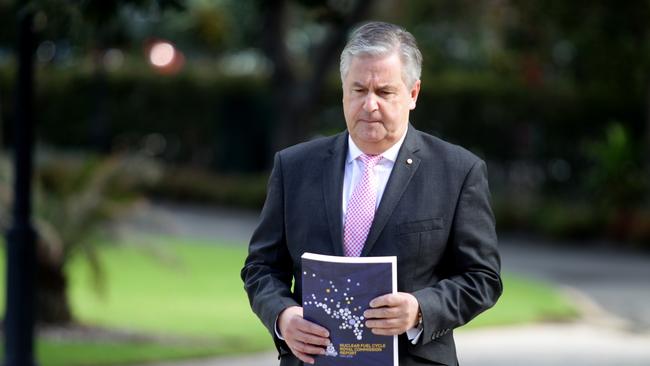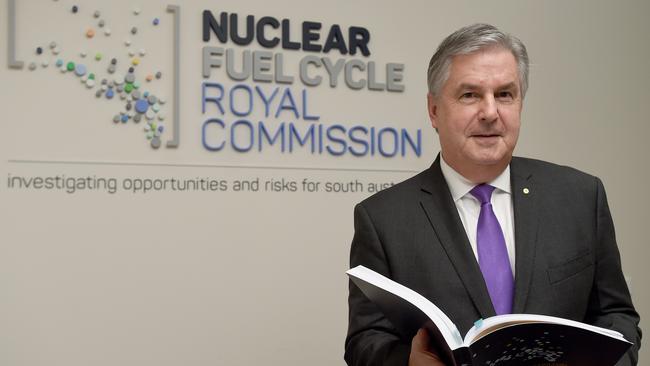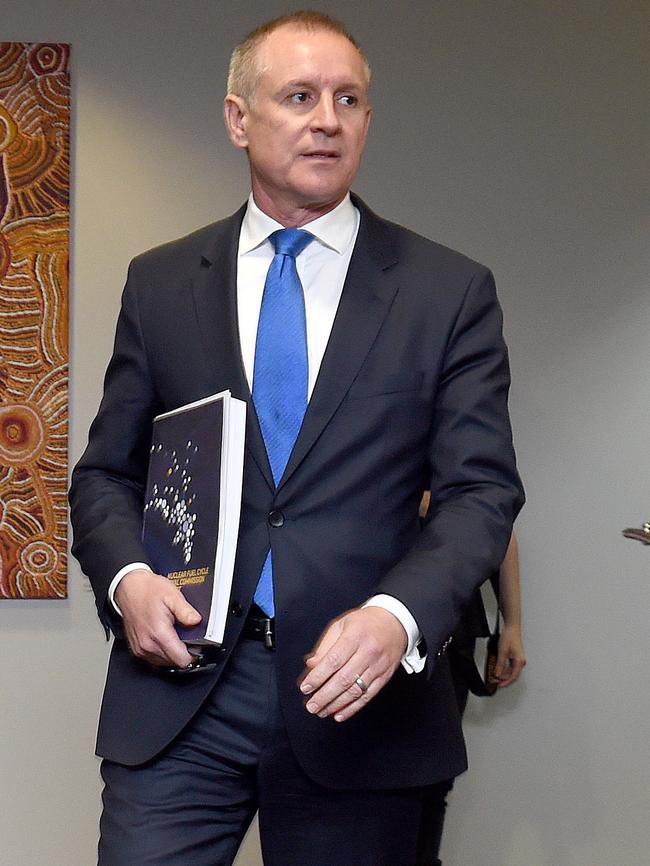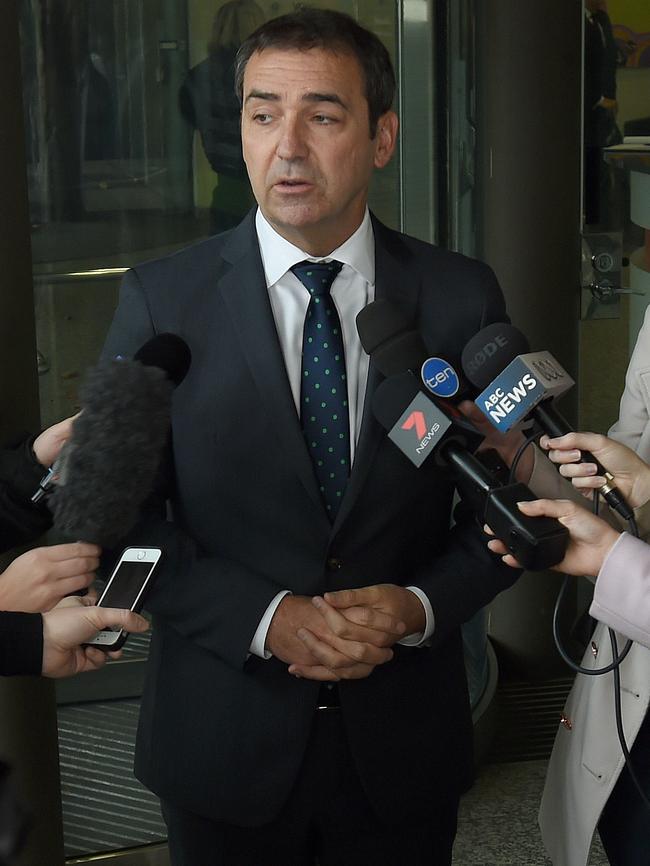Former Governor Kevin Scarce recommends go ahead for nuclear storage in SA
SOUTH Australians will be asked to form a “citizens’ jury” to help determine the state’s future role in the nuclear waste industry, Premier Jay Weatherill has announced. THE RIGHT CALL? VOTE NOW

SA News
Don't miss out on the headlines from SA News. Followed categories will be added to My News.
- Daniel Wills analysis: Is a citizens’ jury clever politics or a cop-out?
- Nuclear waste dump would tip $445b into SA economy
- This is a breathtaking vision for our state
- Nuclear power ‘not viable — for now’
A JURY of 350 randomly selected South Australians will make recommendations to the State Government in November about whether to proceed with plans for a nuclear waste dump.
Premier Jay Weatherill today outlined a six-step process to unfold over the next seven months, culminating in a firm Government position being outlined to State Parliament.
However, no decision on a site for the potential facility will be made until at least next year.
Former Governor Kevin Scarce’s final Nuclear Fuel Cycle Royal Commission report was publicly released yesterday, and strongly called for the state to pursue high-level waste storage.
It found $100 billion in profits could be delivered to the state, generating a massive state wealth fund and unlocking annual revenue for spending on infrastructure and social programs.
Mr Weatherill today again stressed such a project could not proceed without broad political and community support, which he said would be tested through consultation in coming months.
He also revealed the geological testing to determine which parts of the state offered conditions for safe storage could cost $1 billion, a cost likely to be carried by customer nations.
Invitations will this week be sent to 25,000 randomly selected South Australians, which will be whittled down to 50 people who represent a cross section of ages, genders and backgrounds.
It will identify key questions from the Royal Commission which need deeper examination, and lay the groundwork for a statewide consultation to be conducted from July to September.
A second jury of 350 people will then consider those responses, and author a report.
The Government will accept that report in November and come to a decision.
If it elects to proceed with the proposal, geological mapping would have to be undertaken to knock out unsafe areas of the state and local consultation conducted over a site.
Mr Weatherill said a new “Nu-clear” campaign would be launched to promote discussion of the report. About $1 million is currently allocated, with more possible in the June State Budget.
That campaign will include advertising on TV, radio and print, as well as public meetings.
A specific indigenous engagement program will be undertaken separately.

Mr Weatherill said “we want people to come together” and “get involved”.
“It is deliberately an extensive process, because we believe there couldn’t be a more important question which faces the South Australian community,” he said.
“The fundamental underpinning of this is that there needs to be broad community support.
“This is going nowhere if it is going to be the subject of political controversy. “No international partner will want to be part of entering into what is a long-term and extraordinarily expensive set of investments if they don’t think the community is going to be able to deliver on them.”
Mr Weatherill said there was a risk people may be exhausted by the lengthy process.
“There is a tension between fatiguing people with ongoing discussions about this and also making sure that as many people as possible get to hear the information,” he said.
“The truth is that there’s very low awareness of the Nuclear Fuel Cycle Royal Commission. We know that from our own research. That’s the starting point.
“Through the citizens’ jury, hopefully what we will identify is those things that people are actually interested in hearing more information about.”
Opposition Leader Steven Marshall said the Government had “outsourced probably the most important decision in the history of the state to a citizens’ jury”.
“We believe in the Liberal Party that there should be a proper consultation with the people of SA,” he said. “This is an enormously important decision for our state, not something we can outsource.
“A citizens’ jury gave us cycling on footpaths here in South Australia. We do not think that this is the right methodology for making a decision as significant as a nuclear waste repository.”
Mr Marshall said the Liberals had not been included in the design of the consultation process, despite Mr Weatherill’s urging that there be bipartisan support for the process.
“Ultimately, the only way that the legislation is going to pass is if the Liberal Party is convinced that this is something that the people of SA genuinely agree with,” he said.
A Government spokesman said: “It’s disappointing Mr Marshall has chosen to criticise the important role of the community in the process before he receives a briefing from the Government”.
“All South Australians will get the chance to take part in the consultation, however the ultimate decision will remain one for the State Government,” the spokesman said.
Approval of nuclear storage also needs approval from Federal Parliament.
Mr Scarce made 12 recommendations, which include ending bans on the use of nuclear power and enrichment of uranium. He finds only nuclear storage is likely to be viable in the medium term and that it “should be actively pursued, and as soon as possible”.
It is estimated to be about a decade before SA could host a storage facility, because as well as needing both state and federal approval, it would demand the construction of about $2 billion in new infrastructure including a port, rail and roads before waste arrived.
Mr Weatherill is expected to detail further steps later this week. However, Mr Scarce’s report says that should include seeking host community bids and identifying customers.
“A preliminary indication should be sought from potential client countries as to their interest in further discussions on their potential participation,” it states.


“To provide the SA community with more detailed information regarding economic viability and potential benefits, it is necessary to determine with more confidence whether potential client nations would be willing to use an international used fuel storage and disposal facility.”
Countries with large stockpiles include Korea, Japan, Germany, Spain and Belgium.
The report stresses that “from the outset, it should be acknowledged that there would be a substantial package of community benefits” and says there could be multiple bidders.
There would also need to be significant scientific studies of the Outback to find land which is dry and stable. Previous analyses have identified the Gawler Craton and Officer Basin, which cover much of the state west of Adelaide, as potentially viable regions.
An Advertiser-Galaxy poll in February showed 48 per cent of South Australians supported a nuclear waste dump for the state, compared with 39 per cent opposed.
Mr Weatherill said on Monday that the Government expected to take a position by the end of the year and determining if community support existed was a complex task.
“There are important ethical, moral, as well as financial considerations,” he said.
“This is an expert report which provides a foundation. The next exercise is a profound one. I don’t see it simply as ticking the ‘community support’ box.”
Australian Conservation Foundation campaigner Dave Sweeney said “the promise of dollar signs seems to have blinded the commission to the known danger signs” and that neither political agreement nor community support had been secured for the project.
Business SA chief executive Nigel McBride said a recent tour of nuclear sites in Europe convinced him that “storage of high-level nuclear waste in SA is a viable proposition”.
“What we found overseas is that it’s not an issue of safety or science anymore, it is an issue about social licence,” Mr McBride said. “It is up to government and industry working together to bring in the expertise that is readily available overseas.”
Federal Resources and Energy Minister Josh Frydenberg said the report was a “sound basis” for further discussion and he would develop a thorough response.
“A re-elected Turnbull Government stands ready to work with the SA Government if they choose to pursue any new economic opportunities in this area,” he said.
The recommendations
1. Simplify approvals for radioactive ore mining, ending the duplication at state and federal processes
2. Make more SA geophysical data available publicly to aid exploration.
3. Undertake more geophysical surveys areas where mineral prospectivity is high.
4. Commit to increased, long-term government spending to search for new mineral deposits.
5. Ensure the full costs of closing down radioactive ore projects are secured before mining starts.
6. Remove state and federal bans on uranium processing activities.
7. Promote commercialisation of more research at the SA Health and Medical Research Institute.
8. End a national ban on nuclear power so it can be used to cut Australia’s carbon emissions.
9. Develop a national energy policy that considers all technologies, including nuclear.
10. Work with the Federal Government to better understand available nuclear power options.
11. Pursue establishment of a used nuclear fuel waste storage and disposal facility in SA.
12. Abolish state laws preventing further taxpayer-funded investigations of the industry.
(Condensed from formal recommendations)


